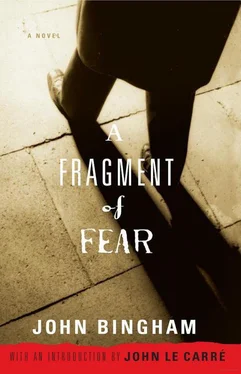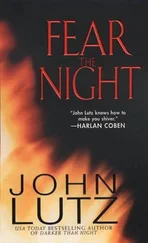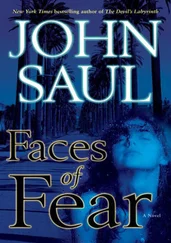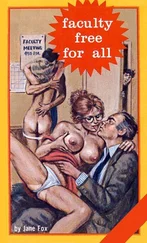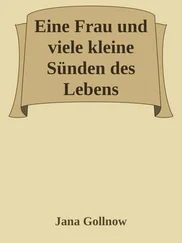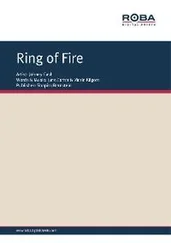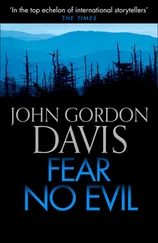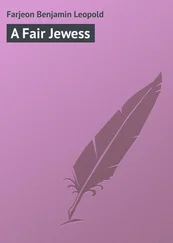John Bingham - A Fragment of Fear
Здесь есть возможность читать онлайн «John Bingham - A Fragment of Fear» весь текст электронной книги совершенно бесплатно (целиком полную версию без сокращений). В некоторых случаях можно слушать аудио, скачать через торрент в формате fb2 и присутствует краткое содержание. Жанр: Триллер, на английском языке. Описание произведения, (предисловие) а так же отзывы посетителей доступны на портале библиотеки ЛибКат.
- Название:A Fragment of Fear
- Автор:
- Жанр:
- Год:неизвестен
- ISBN:нет данных
- Рейтинг книги:3 / 5. Голосов: 1
-
Избранное:Добавить в избранное
- Отзывы:
-
Ваша оценка:
- 60
- 1
- 2
- 3
- 4
- 5
A Fragment of Fear: краткое содержание, описание и аннотация
Предлагаем к чтению аннотацию, описание, краткое содержание или предисловие (зависит от того, что написал сам автор книги «A Fragment of Fear»). Если вы не нашли необходимую информацию о книге — напишите в комментариях, мы постараемся отыскать её.
A Fragment of Fear — читать онлайн бесплатно полную книгу (весь текст) целиком
Ниже представлен текст книги, разбитый по страницам. Система сохранения места последней прочитанной страницы, позволяет с удобством читать онлайн бесплатно книгу «A Fragment of Fear», без необходимости каждый раз заново искать на чём Вы остановились. Поставьте закладку, и сможете в любой момент перейти на страницу, на которой закончили чтение.
Интервал:
Закладка:
I had no conception, until the very end, of what I was up against.
What happened after I had finally said good night to Stanley Bristow and closed his front door can as well be told by the statement I made to the police, at about fifteen minutes past midnight, which ran approximately as follows:
My name is James Compton, of 274 Stratford Road, Kensington, London, W.8. I am an author. At about 11.50 p.m. this evening I left the house of my fiancee, Juliet Bristow, and her parents in Jameson Street to walk home.
At the corner of Jameson Street and Kensington Place, I glanced to the right to see if the road was clear and saw two men standing under some trees on the opposite side of Kensington Place. Kensington Place is not very well lighted. I paid no particular attention.
I walked along Kensington Place into Church Street. At the bottom of Church Street I crossed the road to look into a lighted shop window. When I recrossed the road by the traffic lights I saw two men who might have been those I had previously seen. They turned the corner into Kensington High Street, walking very fast, and I lost sight of them.
I proceeded along the High Street and turned left along Wright’s Lane. At the bottom of Wright’s Lane I turned right, and passed a narrow entrance which leads to a garage. About ten yards further along the road, which is very short, a man came around the corner and stopped me and asked for a light for his cigarette.
He leaned forward towards my lighter and I noticed that his right hand was in his raincoat pocket. I am aware that this sort of approach can sometimes lead to an attack. The street was deserted. I held my lighter away from me, and although I saw nothing suspicious I watched him carefully. As he leaned forward with his cigarette in his mouth, I noticed that his eyes were not watching the flame but appeared to be fixed on something behind me, and at the same time as I noted this I heard a slight noise behind me.
I jumped back and to one side, and turned round. A tall man who in my opinion had been approaching me changed direction and passed me on the edge of the pavement. He walked very fast, almost running, and disappeared round the corner. He was carrying a short object in his right hand which might have been some sort of bludgeon.
I had with me a walking stick formed from a knobkerrie, which is a stick with a heavy knob and is used by African natives as a weapon. I raised this in a defensive position when I turned round. It is possible that in the indifferent lighting he had not noticed the nature of the object I was carrying. It is possible that the sight of it deterred him.
The other man asked me whether anything was the matter. I said no but that I was a little nervy. He thanked me and walked off towards Wright’s Lane.
The tall man was about six feet in height, of normal build and had a round head with what seemed to be a crew-cut hair style, grey trousers, and a light brown knee-length mackintosh with a belt. He had turned the collar up, though it was not raining or cold. This obscured the lower part of his face. He wore no hat. His hair was brown.
The other man was about five feet seven inches tall, stockily built, and had a square face with a cleft chin. He wore a soft hat with a narrow brim. The hat had a cord round it. The tips of his striped shirt collar were fastened down with small buttons. He wore a light grey raincoat without a belt, which reached down below his knees. I think his eyes were light coloured. He had a slight foreign accent. I cannot identify the accent. Both men appeared to be in their thirties. I cannot say for certain that they were the men I had seen in Kensington Place or in Church Street. I might be able to identify them again, especially the shorter one.
“That’s about it,” I said, and signed the stilted, jerky statement. The bored young detective watched me. He stubbed out a cheap tipped cigarette, and leaned back in his chair.
I knew what he was thinking. I was thinking the same thing: when you got it down on paper it looked pretty thin on its own. And there was nothing anybody could do about it now.
The trouble was we had got off on the wrong footing. I went into the police station and said I wanted to report an incident which seemed to link up with something I had already reported to one of their sergeants, and the station sergeant said, “I see, sir,” and showed me into an interview room. Then the young detective came in, but he wouldn’t listen to me.
That was the point, he wouldn’t listen.
He said, “Well, all right, sir, but first let’s get an idea of the present trouble, and then we’ll see, we’ll see about the rest of it. Now what’s the present trouble, sir?”
The point is, it sounded thin, unless you had some idea of the build-up. But he cut me short when I tried to explain. He wanted the hard facts of my present “complaint,” as he called it.
So when he read through what I had written, I knew he was going to be niggly.
“What you saw in his hand might have been a torch,” he said.
“That’s right. It might have been.”
“You say he approached you. He might have been trying to pass between the buildings and you and the other chap-on the inside of the pavement, as it were.”
“He might have been. But we were well over on the inside. The easier way would have been to pass us on the outside.”
“People do funny things when they’re walking.”
“That’s right. But he was approaching me at quite a sharp angle from the pavement edge.”
I saw him turning the thought over in his mind, seeking some other plausible idea.
“Maybe he also wanted a light.”
“Two people without a light for their cigarettes, in the same short, deserted street, at the same time? Well, anyway, why didn’t he ask for one?”
“Maybe because you were waving this knobkerrie thing in his face.”
“Maybe,” I said patiently.
I began to wish I hadn’t gone to the police station. You have the notion that you can wander into a police station and say, “I think two chaps were going to attack me ten minutes ago, off Wright’s Lane. I thought you might like to know.” But it doesn’t work out like that. You’re lucky if you get away within the hour.
It had taken some time to hack out what he wanted me to put on paper. The little interview room, with its glaring strip lighting, was hot, stuffy and foul with the reek of stale tobacco smoke.
“I thought I’d report the incident,” I said. “We’re always being told to report unusual or suspicious things to the police. So I thought I’d mention it. Particularly as there is a bit of background which you won’t let me mention.”
“I’m not stopping you telling me anything, sir,” he said stiffly. “What else do you want to tell me?”
I was obstinate now. “It doesn’t matter. I’ve mentioned it all already to one of your people. Just put this new report in. I’m not going over the whole story again. The reports will connect up some time, provided you have some sort of carding system. Some time they’ll connect up.” I added sourly, “Sooner or later they will, I expect, tomorrow or the next day, this year or next.”
He began to weaken.
“You’re right to report this matter, sir. It’s good of you to call, sir. I’ll make a note of what you’ve just said.”
We got to our feet. He didn’t mean what he said, and he knew I knew he didn’t mean it, but convention was satisfied. He relaxed and smiled.
“Maybe in ten minutes time I’ll be taking a statement from a tall chap in a short raincoat saying he’s been threatened by a gentleman carrying a knobkerrie. That’s the way it goes.”
“Well, you know my address,” I said, and did not smile.
I came out of the police station. A uniformed police officer was walking slowly round my car, almost audibly sniffing, as a dog will walk around another dog.
Читать дальшеИнтервал:
Закладка:
Похожие книги на «A Fragment of Fear»
Представляем Вашему вниманию похожие книги на «A Fragment of Fear» списком для выбора. Мы отобрали схожую по названию и смыслу литературу в надежде предоставить читателям больше вариантов отыскать новые, интересные, ещё непрочитанные произведения.
Обсуждение, отзывы о книге «A Fragment of Fear» и просто собственные мнения читателей. Оставьте ваши комментарии, напишите, что Вы думаете о произведении, его смысле или главных героях. Укажите что конкретно понравилось, а что нет, и почему Вы так считаете.
